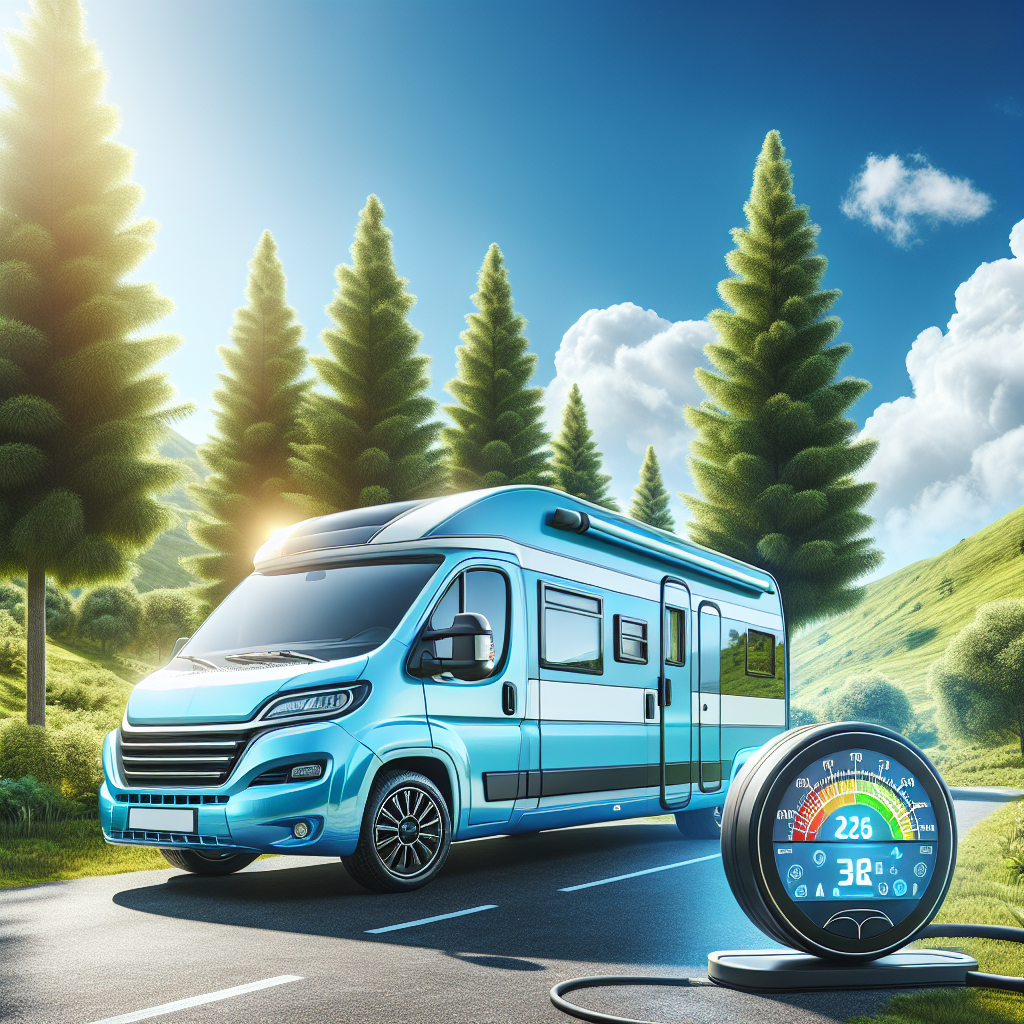For campers, ensuring that your vehicle is in top condition is essential for a safe and enjoyable trip. One of the most vital aspects of this is maintaining proper tire pressure, which is where TPMS (Tire Pressure Monitoring Systems) come into play. A reliable TPMS for campers not only alerts you to tire pressure fluctuations but also contributes significantly to overall road safety.
Under-inflated tires can lead to a variety of issues, including increased tire wear, reduced fuel efficiency, and even catastrophic tire blowouts. These events can compromise the safety of both the camper and its occupants. Therefore, having a TPMS installed means that you can continuously monitor your tire pressure in real-time, allowing for immediate action when necessary.
Furthermore, a well-functioning TPMS can enhance your driving experience by providing peace of mind. Knowing that you are receiving accurate data about your tire conditions allows you to focus more on the adventure ahead rather than worrying about the potential risks of tire failure.
With the right TPMS solutions available, you can easily transform your camper into a smart vehicle equipped with advanced monitoring technology. This makes it possible for you to enjoy your travels while keeping safety as a top priority. Tow with peace of mind, knowing that trailerwatchdog is standing guard. Visit trailerwatchdog.com to learn more about our innovative solutions.
Key Features to Look for in TPMS Systems

When selecting the ideal TPMS for campers, it is crucial to consider a variety of features that enhance performance and reliability. Understanding these key features can help you make an informed decision and ensure safety on the road. Here are some essential aspects to look for:
- Real-time Monitoring: Choose a TPMS that offers real-time tire pressure and temperature monitoring. This feature allows you to receive instant alerts about any irregularities, enabling you to take action before issues escalate.
- Wireless Connectivity: A wireless TPMS simplifies installation and provides ease of use. Look for systems that connect via Bluetooth or Wi-Fi, ensuring seamless data transmission to your smartphone or dedicated display unit.
- Battery Life: Opt for systems with long-lasting battery life. This is essential for reducing maintenance and ensuring continuous monitoring during your travels.
- Alerts and Notifications: A good TPMS should offer customizable alerts for low tire pressure, high temperature, and other critical conditions. These notifications should be loud enough to capture your attention, even while driving.
- Compatibility: Ensure that the TPMS is compatible with your specific camper model and tire types. Some systems may have limitations, so it’s important to verify that it will work effectively with your setup.
By focusing on these key features, you can choose a TPMS that enhances your safety and driving experience, making every camping adventure enjoyable and worry-free.
Top Recommended TPMS Brands for Campers

With numerous options available in the market, selecting the right TPMS for campers can be daunting. To simplify your decision-making process, here are some of the top recommended brands known for their reliability, quality, and advanced features:
- Garmin: Renowned for its innovative technology, Garmin offers TPMS solutions that seamlessly integrate with their GPS devices. Their systems provide real-time tire pressure monitoring and are user-friendly, making them a top choice for many camper owners.
- Truck System Technologies (TST): TST is a prominent brand that specializes in TPMS for RVs and trailers. Their products are equipped with advanced features like solar-powered sensors and customizable alerts, ensuring optimal tire health and safety.
- EEZTire: Known for its easy installation and user-friendly interface, EEZTire provides reliable monitoring solutions for campers. Their systems come with multiple sensor options and long battery life, catering to a variety of needs.
- Schrader: A well-respected name in the automotive industry, Schrader offers TPMS solutions that are durable and efficient. Their systems are designed to withstand tough conditions, making them ideal for adventurous campers.
- iTPMS: This brand offers an affordable yet effective TPMS solution. iTPMS systems are known for their simplicity and effectiveness, providing essential monitoring features without overwhelming users.
Choosing any of these brands ensures you invest in a quality TPMS that prioritizes safety and performance on your camping trips. Each brand provides unique features that cater to different needs, making it easier for you to find the perfect fit.
How TPMS Enhances Safety and Performance
Implementing a TPMS for campers significantly enhances both safety and performance during your travels. Here’s how:
- Real-Time Monitoring: A TPMS provides continuous, real-time data regarding tire pressure and temperature. This instant feedback allows drivers to make informed decisions, reducing the risk of driving on under-inflated or over-inflated tires, which can lead to blowouts.
- Prevention of Tire Failures: By alerting you to abnormal tire conditions, a TPMS helps prevent catastrophic tire failures. Early warnings enable you to address issues before they escalate, ensuring a safer journey.
- Improved Fuel Efficiency: Properly inflated tires contribute to better fuel efficiency. A TPMS helps maintain optimal tire pressure, which can lead to cost savings on fuel during long trips.
- Enhanced Handling and Stability: When tires are correctly inflated, the handling and stability of your camper improve significantly. This translates into a more controlled and enjoyable driving experience, especially on winding roads or in adverse weather conditions.
- Extended Tire Life: Regular monitoring of tire pressure can prolong the lifespan of your tires. By ensuring they are always at the recommended levels, you minimize uneven wear and tear, saving you money in the long run.
Incorporating a TPMS into your camper not only ensures your safety but also enhances the overall performance of your vehicle. This investment pays off through increased efficiency, comfort, and peace of mind on every journey.
Installation Guide for TPMS in Campers

Installing a TPMS for campers is a straightforward process that can typically be completed in a few simple steps. Below is a basic guide to help you through the installation:
- Choose the Right System: Before starting, select a TPMS that suits your camper's needs. Ensure that it can monitor all tires, including any trailer tires, and check for features such as real-time alerts and temperature monitoring.
- Gather Necessary Tools: You will need a few basic tools, including a wrench, screwdriver, and possibly a tire pressure gauge. Make sure to have the TPMS components ready for installation.
- Remove Valve Caps: Begin by removing the valve caps from each tire. This will allow you to attach the TPMS sensors directly to the tire valves.
- Install the Sensors: Attach the TPMS sensors to the tire valves. Most sensors are designed to screw on easily. Ensure they are secured tightly to prevent any air leaks. Check the manufacturer's instructions for specific torque requirements.
- Power Up the System: Many TPMS systems come with a display unit that requires power. Follow the installation guide to connect this unit to your vehicle's power supply, usually through the 12V outlet or by hard-wiring it.
- Calibrate the System: After installation, calibrate the TPMS according to the manufacturer's instructions. This step ensures accurate readings from the sensors.
- Testing: Once everything is installed and calibrated, conduct a test drive. Monitor the display for readings and alerts to ensure that the system is functioning correctly.
By following these steps, you can successfully install a TPMS in your camper, enhancing safety and performance on the road. Always refer to the specific installation manual provided with your TPMS for detailed instructions tailored to your system.
Maintaining Your TPMS for Long-Term Reliability

To ensure that your TPMS for campers remains reliable over time, regular maintenance is essential. Here are some tips to keep your system functioning optimally:
- Regularly Check Sensor Batteries: Most TPMS sensors are battery-operated. Check the battery levels periodically, and replace them as needed, typically every 5-7 years, depending on usage and brand.
- Inspect for Damage: Regularly inspect the sensors for any signs of damage or wear. Look for cracks or loose fittings that could affect performance. If any parts appear compromised, replace them immediately.
- Calibrate Your System: Calibration may be required after tire changes or adjustments. Follow the manufacturer's instructions to recalibrate the system to ensure accurate readings.
- Monitor Tire Pressure Regularly: Even with a TPMS installed, it’s wise to check tire pressure manually from time to time, especially before long trips. This helps ensure that the TPMS is providing accurate data.
- Update Software: Some advanced TPMS systems have software that can be updated. Check the manufacturer’s website for any available updates that can enhance functionality or add features.
By committing to regular maintenance, you can enhance the longevity and reliability of your TPMS, providing peace of mind while on the road. Tow with peace of mind, knowing that TrailerWatchdog is standing guard. For more information on our comprehensive trailer monitoring solutions, visit trailerwatchdog.com.








